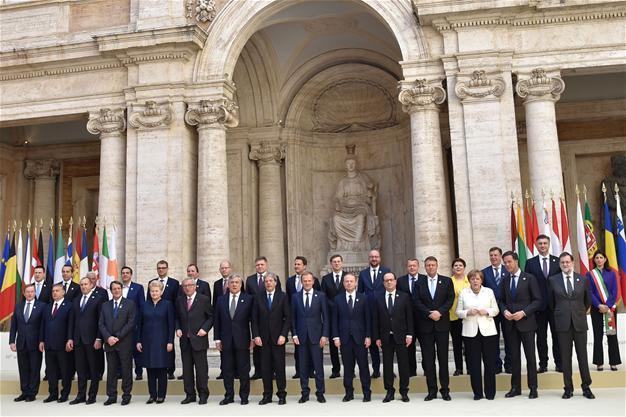Troubled EU renews vows on 60th anniversary
ROME - Agence France-Presse

AFP photo
European Union leaders renewed their vows at a special summit in Rome on March 25, celebrating the troubled bloc’s 60th anniversary with a commitment to a common future without Britain.
Meeting without Britain just days before it triggers its divorce. from the EU, the other 27 countries signed a new declaration on the Capitoline Hill where six founding states signed the Treaty of Rome on March 25, 1957.
With the EU facing crises including migration, a moribund economy, terrorism and populism, as well as Brexit, EU President Donald Tusk called for leadership to shore up the bloc.
"Prove today that you are the leaders of Europe, that you can care for this great legacy we inherited from the heroes of European integration 60 years ago," Tusk said.
"It is it a bit of a tighter squeeze in the room today" than when the original six states signed up, joked Italian Prime Minister Paolo Gentiloni after welcoming the leaders to the Renaissance-era Palazzo dei Conservatori for a ceremony long on pomp and short on real politics.
"We have had 60 years of peace in Europe and we owe it to the courage of the founding fathers," Gentiloni said, adding that after recent crises "we have to start again and we have the strength to do that."
The Rome Declaration that the leaders signed, followed by a round of applause, proclaims that "Europe is our common future" in a changing world.
But it also enshrines for the first time a so-called "multi-speed" Europe, in which some countries can push ahead on key issues while others sit out, an idea pushed by France and Germany but opposed by many eastern EU states.
French President Francois Hollande said the message from Rome was, "we’re stronger together," while German Chancellor Angela Merkel hailed: "a great day for Europe."
European Commission chief Jean-Claude Juncker, who signed the declaration with a pen used by representative from his native Luxembourg to sign the original Treaty of Rome, insisted the EU could ride out recent storms.
"Daunting as they are, the challenges we face today are in no way comparable to those faced by the founding fathers," he said, recalling how the new Europe was built from the ashes of World War II.
The leaders had the words of Pope Francis ringing in their ears, after the pontiff warned on the eve of the summit that the crisis-ridden bloc "risks dying" without a new vision.
The White House meanwhile congratulated the EU on its 60th birthday, in a notable shift in tone for President Donald Trump’s administration, whose deep scepticism about the bloc has alarmed Brussels.
Security was tight with snipers on rooftops, drones in the skies and 3,000 police officers on the streets following an attack this week in London claimed by the Islamic State of Iraq and the Levant (ISIL) group.
British Prime Minister Theresa May’s absence, four days before she launches the two-year Brexit process, and a row over the wording of the Rome declaration have underscored the challenges the EU faces.
Greece, currently wrangling with the eurozone over getting more cash from its latest bailout, was the key country holding up approval of the document, by insisting on a mention of social benefits.
Polish Prime Minister Beata Szydlo, fresh from a bitter row over former premier Tusk’s re-election as EU chief, only agreed to sign at the last minute due to objections over the reference to a "multi-speed" Europe.
In a break from the EU’s vows of "ever closer union", the declaration now says that "We will act together, at different paces and intensity where necessary, while moving in the same direction."
The rows overshadowed the summit’s aim to channel the spirit of the Treaty of Rome that Belgium, France, Italy, Luxembourg, The Netherlands and West Germany signed in 1957 to create the European Economic Community (EEC).
The treaty was signed in the Horatii and Curiatii hall of the Palazzo dei Conservatori, one of the Renaissance palaces that line the Michelangelo-designed Capitoline Square.
Police in the Eternal City were on alert not only for lone wolf attackers in the wake of the British parliament attack on Wednesday, but also violent anti-Europe protesters.
Demonstrators -- both pro- and anti-Europe -- began gathering in Rome for a series of marches throughout the day, including some anti-Brexit demonstrators waving Union Jack flags.
"I was a girl during the war and this grand European movement has become my political ideal," Catherine Chastenet, 74, a marcher from Paris, told AFP.
